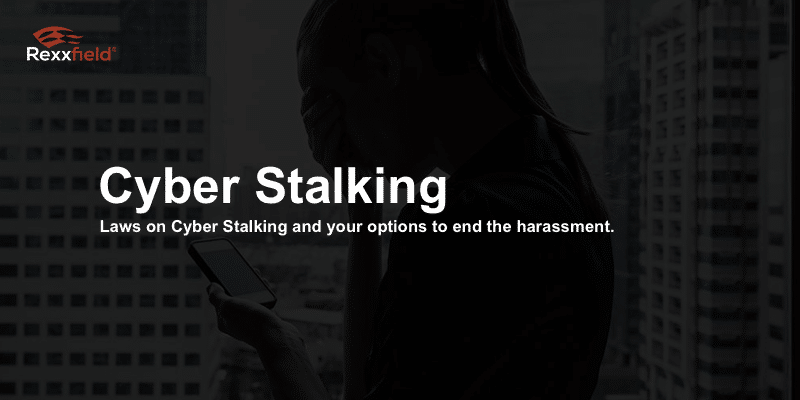Enduring cyberstalking is disrupting, exhausting, and sometimes traumatizing. It not only disrupts your life, but the consequences and the pain caused by cyberstalking go much deeper. It gets into the victim’s head, breaks hearts, and ruins lives, marriages, and families, often leaving victims with significant psychological trauma. One of the main contributors to this is the feeling of being powerless, that they can’t do anything to stop or identify the person responsible for it.
But we are here to tell you that you can.
What is Cyberstalking?

Online stalking behaviour can include:
- Impersonation
- Spreading false accusations or rumours
- Posting intimate material, like nude photos or videos.
- Porn revenge
- Sextortion
- Harassment through ongoing anonymous texting, emails, or social media messages
Cyberstalker Behaviour
We deal with victims of cyberstalkers daily. These are some of the most common behaviour traits we see:
The stalker will find new ways to get your attention, even if you ignore them.
For cyberstalkers, their behaviour and the attention they seek are a substitute for a relationship. They want your attention all the time. When they don’t get the desired attention, their cyberstalking will increase and may become threatening. Some clients have described this to our cyber investigators as mental rape, because it forces them to engage with someone when they don’t want to. If they do or don’t respond, they can’t seem to win.
The cyberstalker starts harassing people around you.
Cyberstalkers are obsessed with their victims. They’ll check your social media multiple times a day, and stalk your friends and family’s social media to get more information about what you are up to. If they can’t seem to get the desired attention, they’ll turn to people around you to get your attention. They’ll either humiliate you or pretend to care about you. In some cases, they may spread false information to your workplace to damage your reputation and career.
The cyberstalker hacks your accounts and devices to access your information.
People who are involved in cyberstalking think and fantasize about their victims all the time. They want to gain control over you, for which they need to know everything about you. What better way than to hack your devices and accounts? To prevent this from happening, always different passwords for each account, and set up two-step authentication if you have not done so already.
The stalker seems to know a lot about your whereabouts.
We often hear from victims how they feel that their stalker knows a lot about where they are. In some cases, ongoing cyberstalking causes victims to become paranoid. In other cases, the stalker pretends to know where you are to scare you. And in rare cases, they follow someone with a GPS tracker, in which case it may be worth checking your car for one.
Your options
Firstly, if you fear for your safety or of someone else around you, contact the police immediately. If there are no clear threats in the messages, it is unfortunately unlikely that the police will help because they are understaffed or simply don’t know what to do. To increase your chances of the police helping you, make sure to collect evidence of all incoming messages.
Then tell your cyberstalker to stop. Do this once, and disengage immediately after. If you keep responding, you will give the stalker exactly the attention they crave.
If you know who your stalker is, collect evidence of this as well to give to the police.
But in most cases, the stalker is anonymous and hiding behind VPNs, fake phone numbers, burner phones, fake social media profiles, and Proton email addresses. If the harassment is ongoing and actively happening now, our investigators can help you trace the cyberstalking back to an IP address, device details, and more valuable information. If you have a suspect, we can rule in or rule out this person, so you don’t have to subpoena, which saves you a lot of time and money.
Laws on Cyberstalking
In the United States
In the US, both state and federal laws prohibit cyberstalking. Only the cyberstalking law in Florida states that the stalking has to occur within the state’s borders. Whereas according to federal law, cyberstalking is within and crosses state lines. So when someone from Texas harasses someone in Florida via online means, cyberstalking will fall under federal jurisdiction.
The federal law about cyberstalking is 18 U.S.C. § 2261A(2). According to this law, it’s unlawful for any individual to engage through electronic communication in a way that makes another individual reasonably fear death or bodily harm to themselves or someone around them. Even if it causes substantial emotional distress.
For someone to be considered a cyberstalker under federal law, they must have acted with the intention of:
- Harass
- Kill
- Injure
- Intimidate
- Keep someone under surveillance with the intent to do any of the above.
In Australia:
In Australia, you can file criminal charges under the Criminal Law Consolidation Act 1935 (SA) under which it is a criminal offence to make an “unlawful threat” to harm or kill a person. This unlawful threat can be done through using electronic technology.
These are unlawful threats.
Threat to kill
S 19 (1) Someone is committing an unlawful threat if that person:
(a) threatens, without a lawful excuse, to kill or endanger the life of someone else; and
(b) intends to cause a fear that the threat will be, or is likely to be, carried out, or is recklessly indifferent whether such a fear is aroused.
Threat to cause harm
S 19 (2) Someone is committing an unlawful threat if that person:
(a) threatens, without a lawful excuse, to cause harm to someone else; and
(b) intends to cause a fear that the threat will be, or is likely to be, carried out, or is recklessly indifferent whether such a fear is aroused.
Or under the s 31 of the Crimes Act 1900 (NSW), the following actions are considered an offence:
“A person who intentionally or recklessly, knowing its contents, sends or delivers, or directly or indirectly causes to be received, any document threatening to kill or inflict bodily harm on any person is liable to imprisonment for 10 years.”
The emotional toll on victims
Dealing with cyberstalking by a sociopath messes with your head, makes you feel down and, in some cases, even triggers PTSD-like symptoms. But it’s not just a mental battle; it can mess up your life in other ways too. You may have noticed you are distancing yourself from loved ones, especially if those people close to you are being harassed because of you.
If you are subjected to someone spreading lies about you, damaging your reputation, hacking your devices and accounts, messing with your finances, stealing your identity or impersonating you, and this may have even cost you your job, it is not something you can ignore. It is a total violation of your privacy, and this fear can seep into your everyday life, making you constantly watch your back.
This can worsen your stress or even make you paranoid, which affects your relationships. Close connections suffer because you find it hard to trust people, and you are always on edge. It’s tough, very tough.
But here’s the thing: you don’t have to face cyberstalking alone.
Reach out to friends, family, or professionals who can help. Don’t hesitate to report it to the authorities, and take steps to secure your online life. There’s a way out, and support makes all the difference. We talk to people in your situation on a daily basis, and understand what you are going through. We can help you collect the evidence you need to take to the police or court, to stop this cyberstalking for once and for all.


